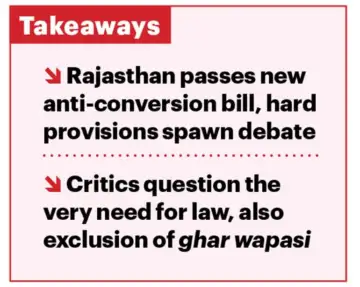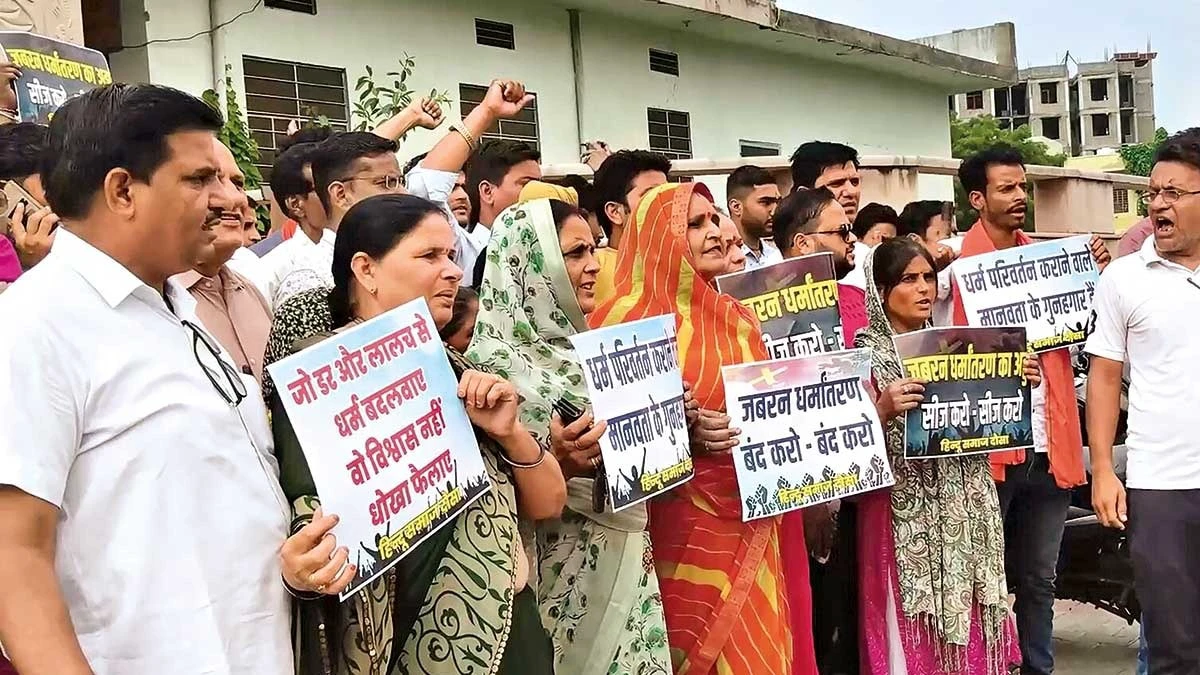If history were to proceed backwards, a lot of powerful Rajput ruling dynasties from Rajasthan’s past would face the mortification of being dragged in front of modern courts.
Interfaith weddings were the currency of their power. But today, state by state, India seems to be converting to a different article of faith. And Rajasthan has not only become the latest to pass an anti-conversion bill, it has surpassed all others in the stringency of its provisions.
The Rajasthan Prohibition of Unlawful Religious Conversion Bill, 2025, marks the state’s third legislative venture of its ilk, its 2005 and 2008 editions having failed to get gubernatorial or presidential approval. Unlike those, however, this bill is stirring nationwide debate due to its near-criminalisation of interfaith marriages. A marriage where either spouse has converted will be void in the eyes of the state. There’s an exception, of course. For “ghar wapasi”, largely understood to entail a “return” to Hinduism.
 The bill-awaiting the Governor’s nod-criminalises religious conversions by allurement, fraud, force, undue influence, misrepresentation, or marriage. These will constitute cognisable, non-bailable offences. Penalties range from 7-14 years in jail and Rs 5 lakh fine, scaling up to 10-20 years and Rs 10 lakh minimum for targeting minors, women, the differently abled, or members of Scheduled Castes/Tribes. The last is not irrelevant: there have been sporadic reports of tribal conversions to Christianity and the emergence of new churches in the southern districts.
The bill-awaiting the Governor’s nod-criminalises religious conversions by allurement, fraud, force, undue influence, misrepresentation, or marriage. These will constitute cognisable, non-bailable offences. Penalties range from 7-14 years in jail and Rs 5 lakh fine, scaling up to 10-20 years and Rs 10 lakh minimum for targeting minors, women, the differently abled, or members of Scheduled Castes/Tribes. The last is not irrelevant: there have been sporadic reports of tribal conversions to Christianity and the emergence of new churches in the southern districts.
Mass conversions and repeat offences draw even harsher sentences-20 years to life imprisonment, with fines going up to Rs 50 lakh. Properties and institutions found promoting unlawful conversion face confiscation, demolition, cancellable licence cancellation, and fines of up to Rs 1 crore. Foreign funding? Severe penalties.
Civil liberties groups, led by the PUCL, call special attention to a few red flags. One, “return to ancestral religion” is explicitly excluded. Two, the bill’s broad definition of “allurement”, with the natural potential it carries for harassment of minorities and interfaith couples. Three, the way the bill imposes even on what it calls ‘voluntary’ conversions a good dose of process as punishment: 90 days’ advance declaration, including by the priest concerned, and an appearance before the authorities within 10 days of the act.
WHITHER CONGRESS?
If they condemn the bill as draconian and unconstitutional, the BJP strongly advocates for it, calling it essential to curb “forced” or “induced” conversions, particularly among poor, tribal and underprivileged groups. It claims such conversions are often a result of “greed, fear or deception”. Meanwhile, the Congress evaded voting on the bill, citing an unrelated boycott, and is seen to have deliberately lost a chance to display its valour.
The critics question the very necessity for such bill, citing Rajasthan’s relatively quieter record on community relations than many northern states. Save isolated cases, it has seen no systemic forced conversion or “love jihad”. A conservative society means segregated living is the norm along all axes-that covers the minorities, about nine per cent of the population. So interfaith marriages, especially Hindu-Muslim, are rare anyway. Notable exceptions often serve to highlight the social pressures and stigma around such unions.
One such was the high-profile marriage of IAS officers Tina Dabi and Athar Aamir Khan-it ended in dissolution, both remarrying within their communities. The few known interfaith couples keep a low profile. In their time, they faced social resistance. Today, their counterparts would face modern secular law, whose high priests would annul their marriage.
